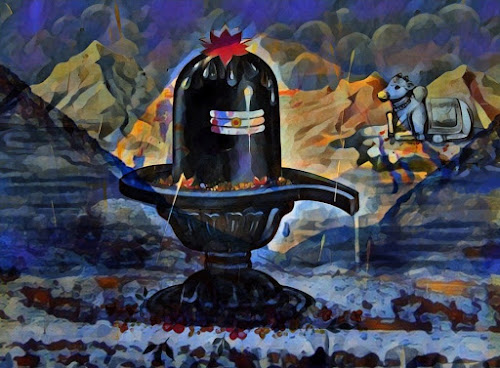Rudrabhishekam的意思是要傳達一切都是希瓦,
且包含在希瓦像中。無希瓦以外。
The meaning of the Rudrabhishekam is to convey that everything is Shiva.
有人說:希瓦是靜止的、動的、不動的。
醒著的、休眠的或睡著的–也是希瓦原則Shiva Tattva。
醒著的、休眠的或睡著的–也是希瓦原則Shiva Tattva。
最偉大,最聰明的事物和最小的事物是希瓦原則Shiva Tattva。
在Rudram儒珈誦經中,有一句經文說:
「 Namo jyeshthaaya cha kanishthaya cha。
Namo dhundhubhyaya cha hananyaya cha」。
這意味著「 向最大和最小的那個(希瓦)致敬。
「 Namo jyeshthaaya cha kanishthaya cha。
Namo dhundhubhyaya cha hananyaya cha」。
這意味著「 向最大和最小的那個(希瓦)致敬。
滋養和破壞及溶解一切的也是希瓦」。
希瓦原則Shiva Tattva(希瓦.塔特瓦)既是無形的,
也是創造界所有形式的體現。
Rudram提到
「Vanchate parivanchate sthayunaam-pataye namo namaha」。
「Vanchate parivanchate sthayunaam-pataye namo namaha」。
意思是,“「希瓦,你是一切的主宰和主人,甚至是那些騙局和欺騙的人也是」。
另一節經文提到
「 Namo vrikshebhyo Harikeshebhyo pashunaam pataye namo Namaha」。
意思是「希瓦!您是所有植物,植被和所有生物的至高神性和主」。
「 Namo vrikshebhyo Harikeshebhyo pashunaam pataye namo Namaha」。
意思是「希瓦!您是所有植物,植被和所有生物的至高神性和主」。
希瓦存在於所有植物,樹木,鳥類,動物和生物中,甚至存在於小偷和詐騙中。
因此,這意味著希瓦是永恆的神性,在創造中所有的人事物中無處不在。
因此,這意味著希瓦是永恆的神性,在創造中所有的人事物中無處不在。
這就是為什麼我們在Rudram中祈禱:「希瓦啊,只有你!無所不在,展現在每一個人」。
因此,將您的仁慈降到我身上,並以一切最適宜的事物祝福我。
The meaning of the Rudrabhishekam is to convey that everything is Shiva, and is contained within the Shiva Tattva. There is nothing beyond the Shiva Tattva.
It is said: that which moves, and that which is steady and immobile – is the Shiva Tattva. That which is awake and that which is dormant or asleep – is also the Shiva Tattva. That which is greatest, supremely intelligent, and that which is the smallest – is the Shiva Tattva. In the Rudram chanting there is a verse which says, “Namo jyeshthaaya cha kanishthaya cha. Namo dhundhubhyaya cha hananyaya cha”. It means Salutations to that (Shiva Tattva) which is the greatest and the smallest; That which nurtures andThat which destroys and dissolves everything – is also the Shiva Tattva. Shiva Tattva is both the unmanifest, and the manifest in all forms of Creation.
The Rudram mentions “Vanchate parivanchate sthayunaam-pataye namo namaha.”. It means, “O Lord Shiva, you are the presiding Lord and Master of everything, even those who cheat and deceive others”. Another verse mentions “Namo vrikshebhyo Harikeshebhyo pashunaam pataye namo Namaha”. It means “O Lord Shiva! You are the Supreme Divinity and Lord of all plants, vegetation, and all living creatures”.
The Shiva Tattva is manifest as and present in all plants, trees, birds, animals and living creatures, even in thieves and cheats. So it means that the Shiva Tattva is the Divinity that is eternal and omnipresent in everyone and everything in Creation. This is why in the Rudram we pray, “O Lord Shiva, you alone are present everywhere and in everything. Hence shower your benevolence upon me and bless me with everything favourable”.
在Rudram誦經結尾後祈禱:「希瓦!祝福每個人都成為我的朋友並對我友善;願一切都適宜我且令人開心。希瓦啊」!
身為Aghora的您,擁有令人愉快的仁慈形式;還有Ghora-恐怖的恐懼形式。
我祈禱你能掩飾你的恐懼形式,並以你令人愉快的仁慈形式祝福我。”
我祈禱你能掩飾你的恐懼形式,並以你令人愉快的仁慈形式祝福我。”
在Rudram的Chamakam部分,我們唱頌:
「 Shancha-me,Mayascha-me,Priyancha-me,
Anukamascha-me,Kamascha-me…」。
「 Shancha-me,Mayascha-me,Priyancha-me,
Anukamascha-me,Kamascha-me…」。
「 Shancha-me」的意思是「 用和平與愛祝福我」。
「Priyancha-me」的意思是「願所有有利的事情對我都發生,所以請實現我的所有願望」。
一開始,我們尊崇禮敬「希瓦啊!您無所不在,無處不在。
我們向您致意禮敬;一次又一次」。
我們向您致意禮敬;一次又一次」。
然後,我們帶著愛請求神的恩惠和祝福:讓我們願望成真和滿足我們的慾望,。
我們祈禱神賜予我們恩典。而我們只要求神降予積極和有利的事物。我們不要求或祈禱懲罰、任何災難、損失或破壞。
我們祈禱在生命中獲得和平和愛。我們還祈禱我們得到生命中所有有利和美好的事物。
我們要求兩者:物質慾望的滿足Bhukti(布克提)和靈性解脫Mukti( 穆克提)。
我們祈禱在生命中獲得和平和愛。我們還祈禱我們得到生命中所有有利和美好的事物。
我們要求兩者:物質慾望的滿足Bhukti(布克提)和靈性解脫Mukti( 穆克提)。
我們還高唱:
「 Maanastoketanaye ma-na ayushhi ma-no goshhu ma-no ashveshu ririshhah。
Viranma-no rudra bhamitoavadhi‘rhavishhmanto namasa vidhema te」。
(Rudram Chanting中Namakam的第10節)。
「 Maanastoketanaye ma-na ayushhi ma-no goshhu ma-no ashveshu ririshhah。
Viranma-no rudra bhamitoavadhi‘rhavishhmanto namasa vidhema te」。
(Rudram Chanting中Namakam的第10節)。
意思是,「上主啊!請祝福我周圍的每個人快樂和健康。
願我們的動物健康安全。
請從您的可怕的形式Ghora Rupa中拯救眾生。
願我們的動物健康安全。
請從您的可怕的形式Ghora Rupa中拯救眾生。
祝福我們大家安祥與快樂」。
Towards the conclusion of the Rudram chanting we pray, “O Lord Shiva! Bless that everyone becomes my friend and is friendly to me; May everything become favorable and pleasing for me. O Lord Shiva! You as Aghora have a pleasant benevolent form; and are also Ghora – having a terrifying fearful form. I pray to You to please conceal your fearful forms, and bless me with your pleasing benevolent form”.
In the Chamakam part of the Rudram we chant, “Shancha-me, Mayascha-me, Priyancha-me, Anukamascha-me, Kamascha-me…”.
‘Shancha-me’ means ‘Bless me with peace and love’.
‘Priyancha-me’ means ‘May all favorable things happen for me, so please fulfill all my wishes’.
In the beginning we honor and worship Lord Shiva by acknowledging, “O Lord! You are everything and present everywhere. Our salutations to you; again and again”.
Then we lovingly ask the Divine for favors and blessings, by fulfilling our wishes and what we desire for. We pray that the Divine bestows Grace on us. Then we only ask for positive and favorable things from the Divine. We do not ask or pray for punishment, or any calamity, loss, or destruction. We pray to receive peace, and love in life. We also pray that we receive everything that is favorable and good in our life. We ask for both Bhukti (fulfillment of material desires) and Mukti (liberation). We also chant “Maanastoketanaye ma-na ayushhi ma-no goshhu ma-no ashveshu ririshhah. Viranma-no rudra bhamitoavadhi ‘rhavishhmanto namasa vidhema te” (Section 10 of Namakam in Rudram Chanting).
It means, “O Lord! Please bless everyone around me with happiness and health. May our animals be healthy and safe. Please save them all from your Ghora Rupa(your terrifying form). Bless us all with peace and happiness”.
rudrabhishekam-meaning-shiva/
rudrabhishekam-meaning-shiva/




沒有留言:
發佈留言